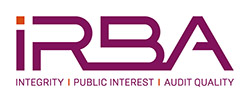|
Johannesburg, Thursday March 28, 2019 – The registered auditor (RA) responsible for the audits of Linkway Trading (Pty) Ltd has been struck from the register of the Independent Regulatory Board for Auditors (IRBA).
In July 2018 the IRBA’s disciplinary committee convened a disciplinary hearing against Jacques Wessels, formerly of KPMG Incorporated (KPMG). He faced six charges of improper conduct each with several sub-charges. At the commencement of the disciplinary proceedings, Wessels pleaded guilty to all six charges of improper conduct on a qualified basis.
Two of the six charges involved allegations of dishonesty, three charges related to negligence and one charge related to a breach of auditor independence. All the charges emanated from auditing the annual financial statements of Linkway Trading for the year ended 28 February 2014.
The committee met on 14 and 15 February 2019 to hear argument on sanction. After considering sanction holistically and not on an individual charge basis, the committee has ordered that the registration of Wessels as an RA be cancelled in terms of Section 51(3)(a)(iv) of the Auditing Profession Act 26 of 2005 (the Act) and that his name be removed from the IRBA register referred to in Section 6 of the Act. In addition, Wessels was ordered to pay a contribution towards the IRBA’s costs.
Further, the committee ruled that the auditor’s name, the name of his firm, the charges against him, the findings in respect of the charges and sanction imposed on him be published by IRBA. In addition, it ordered that the decision on the charges and sanction may be released to the media and directed IRBA to notify the South African Institute of Chartered Accountants (SAICA) of the findings and sanction.
Linkway Trading formed part of a group of companies called Islandsite Group whose major shareholders were the Gupta family. Mr. Wessels was the KPMG engagement partner for Linkway Trading and most of the companies in the Islandsite Group. The charges included audit work relating to transactions for the Gupta wedding held at Sun City in 2013.
This is the first matter arising from the Gupta Leaks to reach a disciplinary conclusion and sanction.
Ends
Notes to Editors:
More on the findings:
- On the first charge Wessels was found guilty of contravening rules 2.1, 2.5, 2.7 and 2.17 of the IRBA’s Rules regarding Improper Conduct. The first charge related to failures on multiple aspects of the audit of Linkway which gave rise to breaches of nine International Standards on Auditing (ISA). The charge dealt with every stage of the audit, namely, planning, execution and finalisation. Among others, Wessels had failed to design and perform enough audit procedures whose nature, timing and extent were responsive to the assessed risks of material misstatement due to fraud as required by ISA 240 (The Auditor’s Responsibilities relating to Fraud in Audited Financial Statements).
- Additionally, there was failure to investigate some seven unusual transactions reflected in the financial records of Linkway, including the Gupta family wedding. Wessels had failed to evaluate the business rationale for these transactions which were outside the normal course of business and failed to identify whether there might be fraudulent financial reporting.
- On the second charge, Wessels had failed to comply with the responsibilities imposed on RAs when conducting an audit in terms of the IRBA’s Money Laundering Guide. He was found guilty of contravening rules 2.1, 2.5, 2.7 and 2.17 of the Rules. The disciplinary committee found that Wessels had failed to apply his mind at all and had failed to document any considerations regarding unusual transactions relating to revenue and the loan account of Linkway. His conduct reflected a lack of understanding and compliance with the laws and regulations governing money laundering and terrorist financing.
- The committee found Wessels guilty on charge three for contravening rules 2.4, 2.6, 2.7, 2.8 and 2.17 of the Rules. He was found to have acted dishonestly in restating the financial statements of Linkway by moving wedding-related hotel and accommodation expenses of R6,9-million from operating expenses to cost of sales, without any corresponding increase in revenue. The amount was therefore treated as an unspecified tax deductible in the production of taxable income (which it was not). The restatement was executed by Wessels initialling and replacing a single original page in the financial statement with an amended and initialled page. The committee found he had failed to comply with any one of the requirements of ISA 560 (Subsequent Events) and he had failed to include a new or amended auditor’s report or emphasis of matter paragraph. He also did not date the restated financial statements at the time of their restatement. As a result, neither SARS nor any other user reading the financial statements for the first time would have detected the amendment.
- The restatement took place in the preparation of Linkway’s annual tax return and the committee found that Wessels’ conduct was an egregious form of dishonesty as he had concurred with a tax employee of KPMG that the tax deduction was not permissible prior to the restatement and actively participated in the subterfuge. The result was a loss of income tax to SARS of more than R2-million.
- Wessels was found guilty of contravening rule 2.4 of the Rules on charge four in that he was dishonest in correspondence with the IRBA. In a written response to the IRBA, Wessels had falsely represented his conduct in relation to the restatement.
- On charge five, Wessels was found guilty of contravening rule 2.7 of the Rules. He failed to ensure that appropriate procedures were performed regarding the continued relationship with Linkway as a client and the assessment of the client’s integrity. His evaluation of the client engagement for 2014 did not take into consideration the adverse media coverage of the Gupta family that was publicly available at the time and instead he allocated, or permitted to be allocated, the lowest category of risk for client acceptance/continuance.
- The committee found on charge six that Wessels had failed to apply his mind when invited to, and subsequently attended, the wedding, and failed to document any considerations regarding the nature, value and intent of the hospitality. This gave rise to a self-interest and intimidation threat and there was no evidence that he had applied professional scepticism or that the threats to objectivity were identified or considered in the circumstances. The committee found that the hospitality was neither trivial nor inconsequential and therefore Wessels should not have accepted the invitation. Accordingly, Wessels was found guilty of contravening rules 2.1, 2.5, 2.6 and 2.17 of the Rules.
More about the IRBA:
The IRBA is a public protection statutory body established to protect the financial interests of the public by ensuring registered auditors and their firms deliver services of the highest quality. It upholds audit firm independence to ensure that audit quality is such that it enhances the accuracy and credibility of financial performance reporting. In this way, the IRBA has an important role to play in building the reputation of South Africa as an investment market for both local and global investors and driving economic growth for the country.
The IRBA also registers suitably qualified accountants as auditors, who must adhere to the highest ethics standards, and promotes the auditing profession through the effective regulation of assurance conducted in accordance with internationally recognised standards and processes.
| Issued by: |
Lorraine van Schalkwyk APR
Manager: Special Projects and Media Relations
The Independent Regulatory Board for Auditors (IRBA)
Contact: 087 940 8800
Mobile: 083 626 3762 |
| On behalf of: |
Bernard Peter Agulhas
Chief Executive Officer |
|





